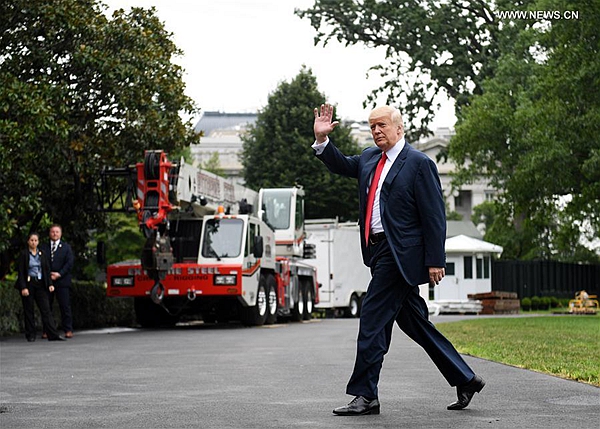Ignore Trump, listen to Mattis and Tillerson on North Korea
- By Sumantra Maitra
 0 Comment(s)
0 Comment(s) Print
Print E-mail China.org.cn, August 15, 2017
E-mail China.org.cn, August 15, 2017
|
|
|
U.S. President Donald Trump walks to his office from Marine One as he returns to the White House in Washington D.C., the United States, on Aug. 14, 2017. [Xinhua/Yin Bogu] |
Are we facing a nuclear war in the Asia Pacific region? This is the question repeatedly being asked these days, and it's not surprising. The last few days have been most jarring, with bewildered experts trying to make sense of it all and wondering how things could get so bad.
To begin with, North Korea, facing overwhelming U.N. sanctions, universally condemned by the Security Council, even by its supposed allies Russia and China, now stands isolated in the world, which is only increasing its bellicosity and lead it to continue missile test launches.
Then President Donald Trump stepped up to declare: "North Korea best not make any more threats to the United States. They will be met with fire and fury the like of which the world has never seen."
Even in the context of Trump Tweets, the words were extreme, and not the type of language one hear from a head state or in the diplomatic community at large. It later transpired that he'd made the statement without consulting any of his aides.
They caught everyone by surprise, with Senator John McCain saying in an interview: "The great leaders I've seen don't threaten unless they're ready to act and I'm not sure President Trump is ready to act."
Trump's words only incited further hostility from North, including a threat to launch missiles at the strategic American island of Guam in the mid-Pacific.
If you want an American voice of reason on North Korea, listen to Secretary of State Rex Tillerson, or Secretary of Defense Jim Mattis. Consider carefully the latter's statement that "the DPRK must choose to stop isolating itself and stand down its pursuit of nuclear weapons….that would lead to the end of its regime and the destruction of its people."
He also said, "The DPRK regime's actions will continue to be grossly overmatched by ours and it would lose in any arms race or conflict it might initiate."
The two most important words are the last two, indicating three things.
First, the huge firepower of the United States is only for deterrent purposes. America has no interest in using military means to seek regime change, and it is ready for regime acceptance and wants to negotiate.
Second, that, in any material or territorial threat to America or its allies in the region, there will be overwhelming retaliation, regardless of the presence of any other great power in the region, such as China and Russia. The U.S. is still the biggest military giant in the region, dwarfing every other power in the theatre of conflict.
Third, conflict, can only be initiated by North Korea, as U.S. has no interest in such a course; should a conflict be initiated by the DPRK, it is doomed. Mattis and Tillerson are reading from the same page in this regard, showing the administration's adults are thinking.
They are also a hint, not just to North Korea, but to China.
These are trying times for everyone in the region, and that also includes Japan and the Republic of Korea, who both feel threatened.
The U.S. navy is involved in Freedom of Navigation Operational Patrols (FONOPs) in the Asia Pacific region. Amidst the unfolding multifaceted conflict, a bombastic leader like Trump is a liability, as words and miscommunication are the chief cause of conflict.
As the U.S. lacks a direct line of communication and channel to North Korea, reading between the lines has become necessary, and is the only way to soothe tensions in jingoistic times.
It is therefore imperative, to understand the meaning of threats. Trump, as everyone knows, speaks without thinking much. That's his style. What we have to pay heed to are the words of the actual adults under Trump such as Mattis and Tillerson.
Miscommunication leads to war. And war in Asia today will be a thousand times more catastrophic than all the conflicts in the last two decades combined.
Sumantra Maitra is a columnist with China.org.cn. For more information please visit:
http://www.china.org.cn/opinion/SumantraMaitra.htm
Opinion articles reflect the views of their authors only, not necessarily those of China.org.cn.







Go to Forum >>0 Comment(s)